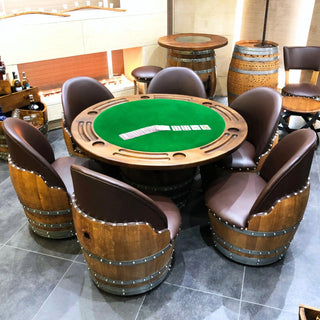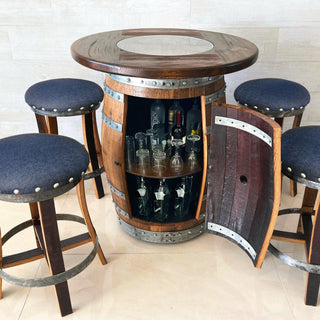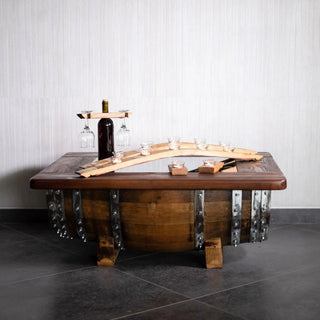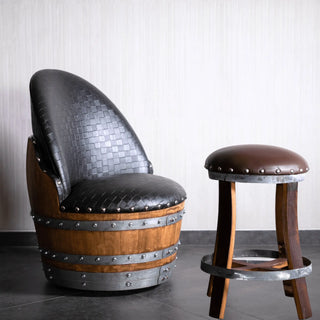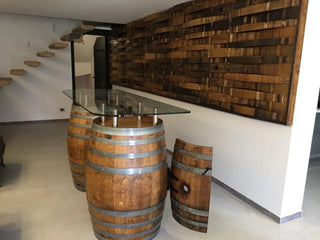
Multi-Use Function and Life Cycle
Oak Barrel Usage
Oak barrels have been used in the winemaking process for centuries, but for a variety of reasons, a winery may decide to discontinue their use. A winery's decision to stop using oak barrels is influenced by a number of factors, including cost, flavor, quality, and even environmental concerns.
Cost is one of the most obvious reasons. Oak barrels are not only expensive to buy, but they also need to be maintained and replaced every few years. This can add up to a significant cost for a winery, especially given the recent increase in the price of oak. As a result, some wineries may decide to discontinue the use of oak barrels in order to save money.
Another reason is the taste. While oak barrels can impart distinct flavors and aromas to wine, not every winery desires those flavors. Some wineries may discover that the oak flavors overpower the natural flavors of the grapes, resulting in an overly oaky wine. Furthermore, some wineries may wish to produce a wine that is fruitier and cleaner in style, with no oak influence. In such cases, wineries may decide to discontinue the use of oak barrels in order to achieve the desired flavor profile.
Quality is also an issue. To ensure the quality of the wine, oak barrels must be properly maintained and cared for. If a barrel is not properly cleaned and maintained, it can have an impact on the quality of the wine. Furthermore, oak barrels can develop leaks or cracks over time, affecting the wine's quality. As a result, some wineries may decide to discontinue the use of oak barrels in order to preserve the quality of their wine.
Another reason wineries may discontinue the use of oak barrels is environmental concerns. Oak barrels are made from a naturally scarce resource. Oak forests must be protected and preserved, and the use of oak barrels is an important part of the oak harvesting process. Wineries seeking to be more environmentally friendly may choose to abandon the use of oak barrels in favor of alternatives such as stainless steel tanks or concrete eggs.
It is important to note that simply because a winery no longer uses oak barrels does not imply that they are no longer producing high-quality wine. Many wineries have successfully made the switch to stainless steel tanks or other alternatives and are still producing excellent wine. The winemaker's preference and the style of wine they want to produce influence the method of aging they use.
To summarize, while oak barrels have been a traditional and necessary tool in the winemaking process, there are several reasons why a winery may decide to discontinue their use. When deciding whether or not to use oak barrels, wineries must consider a variety of factors, including cost, flavor, quality, and even environmental concerns. Alternative methods, such as stainless steel tanks and concrete eggs, can also yield high-quality wine. Finally, the decision to discontinue the use of oak barrels is a matter of personal preference and the style of wine that the winery wishes to produce.
Cost is one of the most obvious reasons. Oak barrels are not only expensive to buy, but they also need to be maintained and replaced every few years. This can add up to a significant cost for a winery, especially given the recent increase in the price of oak. As a result, some wineries may decide to discontinue the use of oak barrels in order to save money.
Another reason is the taste. While oak barrels can impart distinct flavors and aromas to wine, not every winery desires those flavors. Some wineries may discover that the oak flavors overpower the natural flavors of the grapes, resulting in an overly oaky wine. Furthermore, some wineries may wish to produce a wine that is fruitier and cleaner in style, with no oak influence. In such cases, wineries may decide to discontinue the use of oak barrels in order to achieve the desired flavor profile.
Quality is also an issue. To ensure the quality of the wine, oak barrels must be properly maintained and cared for. If a barrel is not properly cleaned and maintained, it can have an impact on the quality of the wine. Furthermore, oak barrels can develop leaks or cracks over time, affecting the wine's quality. As a result, some wineries may decide to discontinue the use of oak barrels in order to preserve the quality of their wine.
Another reason wineries may discontinue the use of oak barrels is environmental concerns. Oak barrels are made from a naturally scarce resource. Oak forests must be protected and preserved, and the use of oak barrels is an important part of the oak harvesting process. Wineries seeking to be more environmentally friendly may choose to abandon the use of oak barrels in favor of alternatives such as stainless steel tanks or concrete eggs.
It is important to note that simply because a winery no longer uses oak barrels does not imply that they are no longer producing high-quality wine. Many wineries have successfully made the switch to stainless steel tanks or other alternatives and are still producing excellent wine. The winemaker's preference and the style of wine they want to produce influence the method of aging they use.
To summarize, while oak barrels have been a traditional and necessary tool in the winemaking process, there are several reasons why a winery may decide to discontinue their use. When deciding whether or not to use oak barrels, wineries must consider a variety of factors, including cost, flavor, quality, and even environmental concerns. Alternative methods, such as stainless steel tanks and concrete eggs, can also yield high-quality wine. Finally, the decision to discontinue the use of oak barrels is a matter of personal preference and the style of wine that the winery wishes to produce.
Interested in shopping for wine barrel furniture? You can browse our full collection of items ranging from coffee tables to home bar and game sets here!
www.obarrel.com/collections
www.obarrel.com/collections

